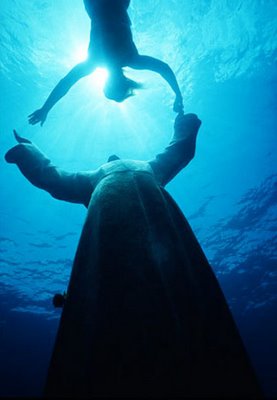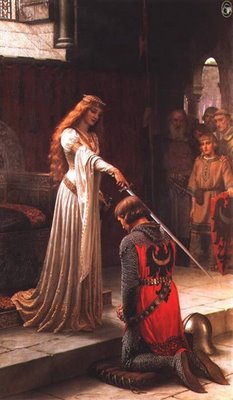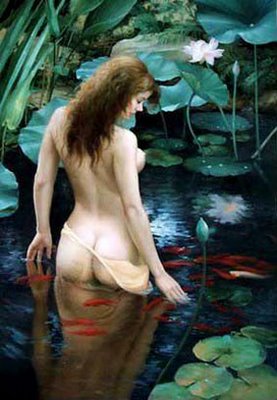Blue Fosterage, Queen's Knight

Sometimes there is not exactly an illness but rather a progressive change in behavior. the candidate becomes meditative, seeks solitude, sleeps a great deal, seems absent-minded, has prophetic dreams and sometimes seizures. All these symptoms are only the prelude to a new life that awaits the unwitting candidate.
But there are also “sicknesses,” attacks, dreams and hallucinations that determine a shaman’s career in a very short time. We are not concerned with whether these pathogenic ecstasies have really been experienced, or have really been imagined, or at least later enriched by folkloric motifs, to end by being integrated into the frame of the traditional shamanic vocabulary. Essential is the fact that these experiences justify the vocation and the magico-religious power of the shaman, that they are invoked as possible validations for a radical change in religious practice.
-- Eliade, Shamanism: Archaic Techniques of Ecstasy, 35-6
BLUE RHETORICS
December 2003
We have seen that the fili
Amargin is also represented
in the Leabhar na Gabhala
as reciting a set of rhetorics
immediately on landing
in Ireland. Presumably,
therefore, he had acquired
them elsewhere.
-- Nora Chadwick,
“Imbas Forosnai”
I am the wind that blows
upon the sea; I am the ocean wave;
I am the murmur of the surges ...
-- from “The Song of Amergin,”
attr. to the early Welsh poet Taleissin
She held my face
in her white hands
that night and
as I slept the
sea slipped into
me, wave after
wave after wave,
filling me with her
wild curvature.
Ah how I drank
Her as I slept,
free at last from
a long drought
of driest words,
her level rising
topmost in my brain.
When I woke
my eyes flew open
and my mouth
began to move,
spilling blue rhetorics
which to this day
I don’t understand,
just sing. It was as
if my tongue had
been pickled in
sea brogue, a
language both
so bitter and too
sweet, its numens
full of beach
bosomage spilling
wavelike from
their brilliant cups.
Cups I would drink
more than my fill
of if I could, but
I was already drowned
and washed back
to that shore where
She was every
wave’s farewelling
kiss, dissolved
and trailing back
to mute eternity.
The words could
only phrase what
never quite got
said between the
plunge and drying
spume, a low echo
of the sea’s wide
weeping when each
night the moon hauls
free a million miles
from Her womb.
I too must sing
in those blue
rhetorics, my tongue
now not of fire
but of the sea.
One day I woke
two thousand miles
north of that sea
I was once baptized
in, reborn to the
God who quells and
purifies Her primal
rough and raucous
ire: My eyes opened
and I saw then
not Him but Her,
curled close to me,
her shape the receipt
of all that foaming
wave which crashed
over me pregnant
with rooms He
might name but
never roam. My
mouth began to
move in ways
never again quite
my own, cerulean
and hooved, professing
a history dredged
up from the abyss,
old lost still gleaming
portents which are
worthless inland
or upstairs, a mother-
of-pearl inlay which
fades to blue
if you stare too hard.
Yet each saying here
rows me further back
to home -- so many
years after that
drowning embrace,
more years down
the road from that
first embracing wave,
so long as to lose
both her and history
to this blue argument
which still washes
wavelike from this
hand and now fades
in a drawling,
shorelike, rhetorical hiss
-- her voice inside
my own, a sea
inside the poem.

From Bullfinch’s Mythology, The Age of Chivalry, Chapter 6: Launcelot of the Lake”
KING BAN, of Brittany, the faithful ally of Arthur, was attacked by his enemy Claudas, and, after a long war, saw himself reduced to the possession of a single fortress, where he was besieged by his enemy. In this extremity he determined to solicit the assistance of Arthur, and escaped in a dark night, with his wife Helen and his infant son Launcelot, leaving his castle in the hands of his seneschal, who immediately surrendered the place to Claudas. The flames of his burning citadel reached the eyes of the unfortunate monarch during his flight, and he expired with grief. The wretched Helen, leaving her child on the brink of a lake, flew to receive the last sighs of her husband, and on returning perceived the little Launcelot in the arms of a nymph, who, on the approach of the queen, threw herself into the lake with the child. This nymph was Viviane, mistress of the enchanter Merlin, better known by the name of the Lady of the Lake.
Launcelot received his appellation from having been educated at the court of this enchantress, whose palace was situated in the midst, not of a real, but, like the appearance which deceives the African traveller, of an imaginary lake, whose deluding resemblance served as a barrier to her residence. Here she dwelt not alone, but in the midst of a numerous retinue, and a splendid court of knights and damsels.
The queen, after her double loss, retired to a convent, where she was joined by the widow of Bohort, for this good king had died of grief on hearing of the death of his brother Ban. His two sons, Lionel and Bohort, were rescued by a faithful knight, and arrived in the shape of greyhounds at the palace of the lake, where, having resumed their natural form, they were educated along with their cousin Launcelot.
The fairy, when her pupil had attained the age of eighteen, conveyed him to the court of Arthur, for the purpose of demanding his admission to the honor of knighthood; and at the first appearance of the youthful candidate the graces of his person, which were not inferior to his courage and skill in arms, made an instantaneous and indelible impression on the heart of Guenever, while her charms inspired him with an equally ardent and constant passion. The mutual attachment of these lovers exerted, from that time forth, an influence over the whole history of Arthur. For the sake of Guenever Launcelot achieved the conquest of Northumberland, defeated Gallehaut, King of the Marches, who afterwards become his most faithful friend and ally, exposed himself in numberless encounters, and brought hosts of prisoners to the feet of his sovereign.

CHAMPION
Nov. 27, 2005
Behind every queen you’ll find a mere of
welled and walled desire, not mine but Yours
for which no quest will ever slake
the lowest leagues of thirsty fire.
Behind the actual shape of love in
her daily cottons is the more difficult
gossamer she is, an individual as alien
to everything inside a suitor as any
next too-mortal bride. One marries
the surfaces one’s heart needs to see
and prays the rest in her abide.
Her king is you, in ordinary troth
and husbandry, a love requited in
shared work and weariness beyond the bed,
in the ramparts of a home it takes years
of surrender to that work to build.
At least, that’s what I’ve learned
about sustaining love, a young man no
more who yet still shares with that first
prince a wild thrall for the sea’s blue
pour inside each wave’s collapsing roar.
My moment here was ferried forth
by him, or him inside Your thrall.
For years I sought nocturnal lists of
revelry, seeking in every quest to gain
a queenly savor to next days, that bit
of sea hard-drenched in blue where
loved reeked the sea’s full flavor:
Yet in my errand I was always denied,
my thrust parried by a troth which
the women looking somewhere else.
I was looking for them to fill my heart,
and so in turn were they; how could
anyone be satisfied drinking
from a lake of fire which the other
cupped in someone else? Always
my wild hope affixed its wings to this
or that shape of faux heaven, flying
to the height of love’s vault to pull
that ring which unleashed abysms.
Always then the crash and burn
inside the wake she left behind,
a burning brand chucked back into
the mere, my dream of queens and
courts remitted in the mire of
my bottomed-out desire. In that
waste of mud her darker shade
arose from depths to cobble
me back together all again,
teaching me the art of unhorsed
arisings, glueing back my broken balls.
Rearmored thus in her salt rectitude,
I rose again to woo and win afresh
the same old wounds. Odd rhythmus,
to be so driven to the same leaping
falls, and foolish, so damn foolish too:
But what’s a knight of cups to do?
Every suitor’s defined by the suit
which starred his water’s birth,
and mine was blazoned in the
birthmark of a heart pierced by
an arrow: lance and cup are both
mine to pour full and empty out.
Behind all courts you’ll find the woods,
a castle in the mere: Behind my
starry venturing a deeper quest
worked the other way, handing me a pen
exactly where that woman’s shape
could never fully welcome me.
By days I am her husband, the king
of my life’s queen: By night (well, early
morning) I am the depths’ salt
champion, a knight of bluest meres,
the thrall of every queen to ride the
lists requiting all that never was
beyond the shimmer and the sheen.

WATER BRIDE
Dec 2002
The water bride returned
in the silted waters
of night: She was weary
of wearing this or that
woman’s face, so she
came blind as the sea.
I was once desperate
to claim her for life
& so kept losing her
in comic motions,
shaping my body for her,
shouting into waves.
None of it worked: She
lapsed on back into surf,
leaving this bald shore,
even her smile erased
in the boneless wash.
But not lost. She curves
every line down this page,
across and down down
down, nothing I’ll kiss
again but deeper, a wave
washed through, forever
afoot in wastes of this heart.
I have been pickled in
her brine: I am that dawn
where she’ll always shine,
that scree of white
slippers dancing where
I pull my every breath.
It’s 5:30 a.m. on Christmas
Eve, the windows open
to a restlessness which
later will pour rain
then turn cold. I am that year
at birth once again:
son and lover of a
uteral gulf which streams
through the day
like the sheets of her
gauze bower, cell and
boudoir, well and tower,
ring to middle finger,
trothed to the wave’s
forever breaking smile.
MARRIAGE OF THE VERSES
May 2002
There’s a marriage
also in this making:
vowels here sworn
in sea-vows
and to the sky,
my consonants carved
to earthly rounds.
I’m married these
ways too: true
to what’s difficult
and eye-level, tempted
by old metaphors,
eloquence, and self-pitying
spleen; faithful
at the cost
of secrets, fame,
and one more hour’s sleep.
Each day I rise
to consummate
this fire, red ichors
of the heart burning
what I find here
on white sheets.
Yet it’s never easy.
I spend too much time
fretting whether I’m
good enough (or at all).
Mid verse I dream
of glissades outside
the ring which horses
me to this pen and
paper every dingdong day.
For weeks, this love
is too dutiful
and nothing sounds
quite right: the effort
seems dilletantish
and silly -- c’mon,
writing poems past
the age of 45 with hardly
a one of ‘em in print!
And when there are
so many more readers
in more golden veins
to bleed. But then
I get up one morning
and the pen sways
and lifts and swoops
in sweet
chariosco, all I
would ever fly on
a day in the life. My
Eden. Love now has
an ecstatic, true ring to it,
not the sum of all
I bring to it, but
rather a door open wide
like husband eyes
at first sight of the
naked bride,
all oceans stilled
to one backdrawing sigh.


<< Home